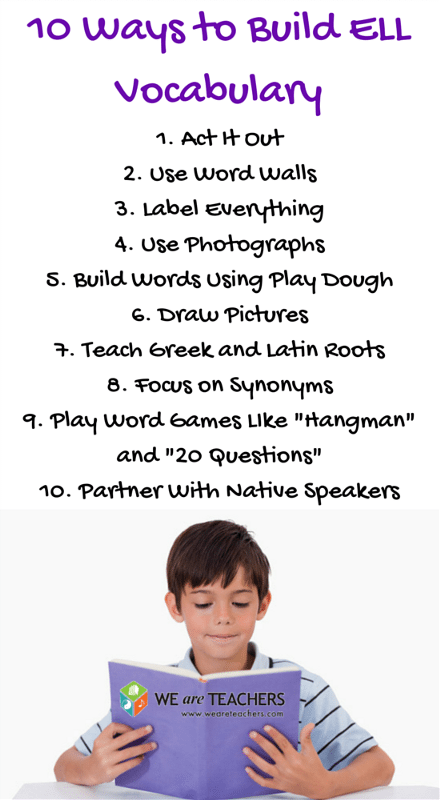10 Ways to Build ELL Vocabulary Skills
This article is the first in a ii-role series on supporting ELL literacy, sponsored past Middlebury Interactive Languages .
If yous teach English-language learners, you lot know what a challenge information technology tin can be to keep vocabulary instruction fresh and engaging. That's why we recently asked educators in our WeAreTeachers Helpline grouping to share their favorite means for growing ELL vocabulary in centre school. Here'due south what they had to say:
Act it out: Shake up your usual vocabulary routine and get students out of their seats by playing a game of vocabulary charades. Write the words that yous want to do on index cards, and invite teams to take turns choosing a card and acting out the give-and-take.
Use word walls: Middle schoolers aren't likewise old for word walls! Try creating dissimilar walls or display areas based on some of their favorite topics (east.g., sports or movies) or categories related to surviving middle school (friendship words, cafeteria words).
Label everything: When you have English-language learners in your classroom, everything from your stapler to your pencil sharpener to your wall clock should be labeled. Get students involved: Have them create labels by cut out and collaging pictures and words from magazines.
Use photographs: Written routines should include photographs to help reinforce the vocabulary words at hand. If yous post instructions for turning in homework, for case, include a photo of a student acting out each pace.
Build words using play dough: Teacher Jill T. recommends giving each student a small-scale container of play dough. Cull a vocabulary word, and challenge all students to brand something that represents the word in under one minute. "Choice a winner from each side of the room, who then act as judges for the next round," says Jill. "7th and eighth graders still beloved play dough!"
Draw pictures: When learning new words, take students illustrate their ain pictures or representations of the word. This combination of visual and verbal exercises can help kids retain new words more apace. A fun variation is to take students make comic strips or books featuring their new vocabulary.
Teach Greek and Latin roots: It may exist old-schoolhouse, but there'due south no dubiousness that pedagogy give-and-take roots and origins is a fast path to agreement entire discussion families. Try having students create flow charts with the root at the top and all of the related words beneath. Or invite students to write a song explaining a give-and-take root and related vocabulary.
Focus on synonyms: Teaching synonyms is another quick way to build vocabulary in a deep, meaningful way. "If they accept learned 'emblem,' they should likewise know 'emblematic' and 'badge,' 'imprint,' 'coat of arms,' etc." says teacher Krista C.
Play word games: Word games like Hangman and twenty Questions are peachy for gaining English-linguistic communication skills and reviewing concepts in your curriculum likewise. Try playing Aboriginal Egypt twenty Questions for instance, where all the answers necktie in to your study of that time period.
Partner with native speakers: You might ask students "what 20 words practice you think all centre schoolers should know?" and have native speakers partner with English-linguistic communication learners to create a presentation sharing their choices.
Desire more than support for your English-language learners? Observe out more about Middlebury Interactive's exciting new curriculum focused on closing the ELL achievement gap.

babbagephompecture.blogspot.com
Source: https://www.weareteachers.com/10-ways-to-build-ell-vocabulary-skills/